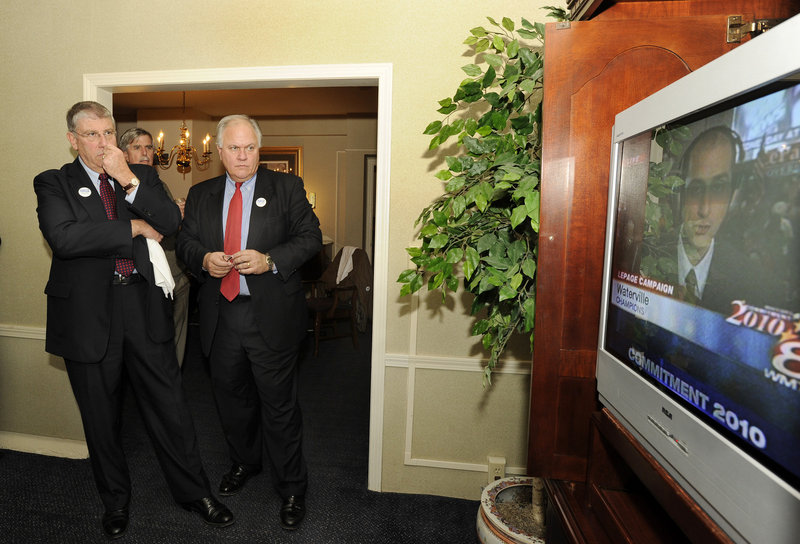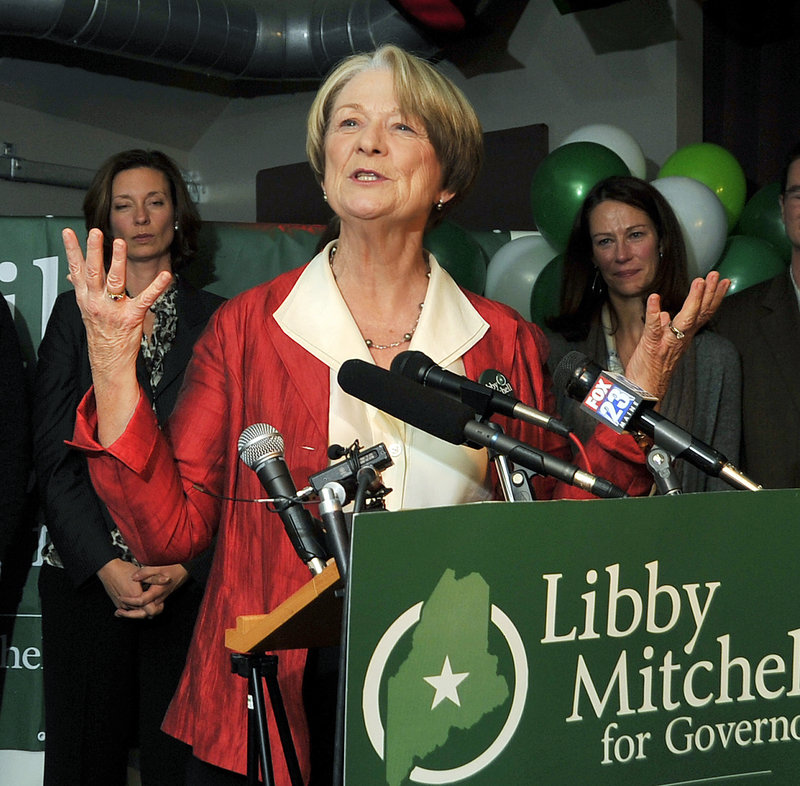Republican Paul LePage held a slim lead early today in the race for Maine governor.
As of 9:30 a.m., LePage had 38 percent of the vote and independent Eliot Cutler had 37 percent, with 89 percent of precincts reporting, according to The Associated Press. About 7,400 votes separated the two candidates.
Democrat Libby Mitchell conceded the race early, at 10 p.m., after initial results gave her about 20 percent of the vote.
“I will be supportive of the next governor, whoever that is,” she told more than 100 supporters at Bayside Bowl, with her family gathered behind her on stage. “We worked on our principles. We stood up for justice. We fought for our school teachers. We stood up for children.”
Mitchell’s early exit was a good sign for Cutler, who worked to draw Democratic voters and undecided voters in the final days and weeks of the campaign.
Cutler consistently led LePage in early returns, winning Bangor and Portland and the larger communities of southern Maine. But LePage took the lead in the vote counting after midnight as more small, rural towns reported results.
“It’s been a long evening and now we’ve taken the lead,” he told supporters at about 1:30 a.m. “We believe it’s going to continue to grow. Unfortunately, I don’t think it’s going to be tonight, but we’re on the right track.”
Cutler told his supporters at about 1 a.m. that he would monitor results throughout the night. Win or lose, Cutler said, the campaign proved that negative campaigning doesn’t work here.
“What we accomplished with the rejection of negative campaigning is so important to the state of Maine,” Cutler told an interviewer.
LePage, the 62-year-old conservative mayor of Waterville, has been the clear front-runner since his runaway victory in the Republican primary in June. A blunt critic of big government and big spending, he was widely expected to ride the national pro-Republican wave into the Blaine House.
Winning election as governor would be the culmination of a remarkable life story.
He grew up in Lewiston’s “Little Canada,” the second-oldest of 18 children, and left his family at age 11 after receiving a beating from his alcoholic father. He later went to college and got a master’s degree in business and is now general manager of Marden’s Surplus and Salvage.
As Waterville’s mayor, he earned a reputation for cutting spending. He had strong support from Maine’s tea party groups.
LePage’s temper and rhetoric got him in some hot water during the campaign. He told voters that as governor he would tell President Obama to “go to hell,” and he blew up at reporters’ questions about homestead tax exemptions on his family’s homes in Maine and Florida. But the dip in his poll numbers was small, and temporary.
“I think he is ornery enough to do something,” said Albert Ingraham, a 61-year-old Republican and vending company owner in South Portland. “He has a good reputation in Waterville. I want change.”
Richard Downs, a 65-year-old retired Democrat in Portland, agreed.
“I think a change is what we need,” he said. “I think he’s going to bring some jobs to our state. We need them.”
Cutler, a 64-year-old lawyer from Cape Elizabeth, had consistently run third in the polls behind LePage and Mitchell for most of the long race. But his campaign surged in the past two weeks after he won newspaper endorsements across the state, and after Democrats came to see him as the candidate most likely to challenge LePage.
Cutler worked for U.S. Sen. Edmund Muskie, D-Maine, helping to write the landmark Clean Air and Clean Water acts. After a stint as a budget manager in the Carter administration, he had a long law career. In recent years, he led a law office in China, a connection that led to some of the campaign’s most controversial ads.
One Democratic mailing had Chinese characters on the front and, on the back, said: “With Eliot Cutler as governor, Mainers might as well learn Chinese.”
Many Democrats objected and some now believe the ads backfired.
On the campaign trail, Democratic voters repeatedly told Cutler they had switched their votes to him because of the mailers.
Former Gov. Angus King, also an independent, also cited the mailers as the reason he decided to endorse Cutler on Saturday. King’s backing, though late in the campaign, was seen as a big boost to Cutler’s chances.
Dennis Blanchette, a 50-year-old independent, cast his vote for Cutler in Yarmouth, in part because of the King endorsement. “I’m tired of the Democrats and Republicans,” said Blanchette.
“He had an idea of what he intends to do – a game plan, whether good or bad,” said Kevin Heenan, a 33-year-old sous chef in Portland. “As opposed to someone who is enthusiastic and throws their hat in – like the tea party guy. He (LePage) is getting people riled up, but has not thought about the issues.”
But many voters clearly cast strategic votes for Cutler.
“I think I would have voted for (Mitchell), but from what I’ve read, the polls I’ve seen, Libby Mitchell was declining so much,” said Gretchen Fleming, a 39-year-old teacher from Norway. “It was a hard decision. I didn’t really love any of them. But I really do not want Paul LePage to win.”
Mitchell remained competitive even in the final weeks, but clearly struggled as a long-time legislator in an election year when voters demanded change.
“She’s the best for all people,” 62-year-old Frank Gironda said after voting for Mitchell in Portland. “She has a lot of experience. She is surely intelligent. And I think it’s time to give ladies a chance.”
Her defeat represents the likely end of a long and historic political career in Maine.
A resident of Vassalboro, Mitchell was first elected to the Maine Legislature in 1974. In 1996, she became the first woman elected by her peers to serve as speaker of the House of Representatives. In 2008, she became the first woman in the country to be chosen as both House speaker and president of the Senate, Maine’s second-highest political office.
“It’s a very distinguished career,” said L. Sandy Maisel, political scientists at Colby College in Waterville. The defeat Tuesday “is not a reflection of her. She was a the wrong candidate at the wrong time.”
Independents Shawn Moody and Kevin Scott became household names but never reached double-digits in the polls. Moody received 5 percent of Tuesday’s votes, and Scott had 1 percent.
Secretary of State Matthew Dunlap warned late Tuesday that it might take time to declare a winner.
Forty percent of Maine’s ballots are hand-counted, so a close gubernatorial race might not be decided until today. A really close race might take even longer to sort out, he said.
Staff Writer John Richardson can be contacted at 791-6324 or at: jrichardson@pressherald.com
Send questions/comments to the editors.







Success. Please wait for the page to reload. If the page does not reload within 5 seconds, please refresh the page.
Enter your email and password to access comments.
Hi, to comment on stories you must . This profile is in addition to your subscription and website login.
Already have a commenting profile? .
Invalid username/password.
Please check your email to confirm and complete your registration.
Only subscribers are eligible to post comments. Please subscribe or login first for digital access. Here’s why.
Use the form below to reset your password. When you've submitted your account email, we will send an email with a reset code.